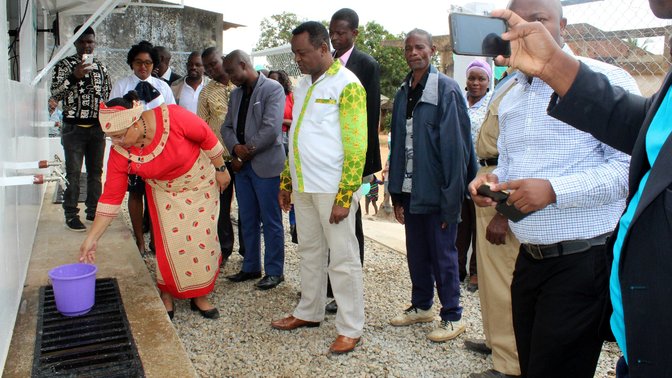
The Adventist Development and Relief Agency (ADRA) officially launched on June 12 its first safe water kiosk in Mocuba, Mozambique, which will provide 20 liters a day of safe water for more than 1,000 people. Mocuba, a district of the Zambezia province in Mozambique, has suffered from inadequate safe water supply for years, but the prolonged drought conditions in Southern Africa has made the situation far worse.
More than 100 people attended the grand opening of the new water kiosk, including Mocuba’s mayor, Beatriz Gulamo, a proud supporter of the community project. “We are very pleased to receive this kiosk. To the entire municipality, this is of great value,” says Gulamo while getting a tour of the new water system. The mayor and several ADRA Mozambique representatives held a ribbon-cutting ceremony and announced that the use of the kiosk is now available.
“Though water vending is not new, ADRA’s water kiosk approach is unique because it is a self-sustaining business model that in addition, distributes safe drinking water,” explained Jason Brooks, senior technical advisor for WASH at ADRA International. “The approach of simply drilling wells and training the community to repair them had to give way to a more sustainable service for larger numbers of people, and ADRA wants to provide the most cost effective and long-lasting water service that will not break down for lack of funds to repair them. With a 15-year presence already established in Mocuba and a great need for safe water, ADRA selected the neighborhood of 6,000 as the first launching point to install the water kiosk.”
Brooks further emphasized that the kiosk is a means to help the community gain access to safe water, and eventually a project that can be maintained by the community. “The residents are the one who will benefit from the kiosk, but ADRA wants to ensure they can take care of the kiosk and sustain the water source so the community receives safe water for a long time,” he says. ADRA will train community members and will help them eventually establish ownership of the kiosk.
The newly implemented kiosk contains numerous features: solar panels atop the kiosk that pumps water automatically from the source to an elevated holding tank, multiple water taps compared to the traditional hand pump allowing faster time for people to receive water, two video monitors for bystanders promoting sanitation and hygiene information to prevent the spread of diseases, ice dispensers, clothes wash and recycling capabilities, and cell phone chargers allowing users at the same time to buy cellphone credits.
Residents would be able to purchase soap, toothbrushes, and feminine products to encourage better hygiene practices, and purchases are managed on a tablet handled by a kiosk attendant. The attendant would also be on site to help monitor the water taps.
ADRA has received full backing from supporters, including the General Conference Adventist Health Ministries, who contributed $60,000 to the project, and Grundfos, a global pump manufacturer, who provided water pump technology for the kiosk.
“A study was conducted previously in Mocuba to better understand the needs of the community, and the biggest need we found was cleaner and safer water,” Brooks says. “People were very open with us about their needs, and their willingness to be part of the solution. We learned that the community wanted safe treated water and didn’t mind paying small fees for the additional resources that came along with the new water system.”
Prior to the water project, many residents were collecting water from contaminated wells or even the nearby river. “We suffered a lot taking water from the river,” commented Mariam Laziza, a mother and resident of Mocuba.
The water was unsafe and tainted from people bathing in the river or washing clothes according to community members. “This is a great relief because with this borehole, the people of CFM will suffer less diseases. We are thankful to ADRA,” says Santos Jose, Mocuba’s community leader. “The water system represents an innovation for ADRA that will replace the type of interventions ADRA had in water supply and well drilling,” adds Armindo Salato, programs director of ADRA Mozambique.
Now, with the installment of the new water kiosk, anyone could fetch gallons of safe water at their leisure in a safer environment. The kiosk is located near the community’s school and in a public setting.
“ADRA wants to be at the forefront of responding to pressing needs for basic essentials such as water,” said Brooks, “We plan to run two to three other kiosks in other locations, but this is a pilot that we will test out for a while before we can do so.”



